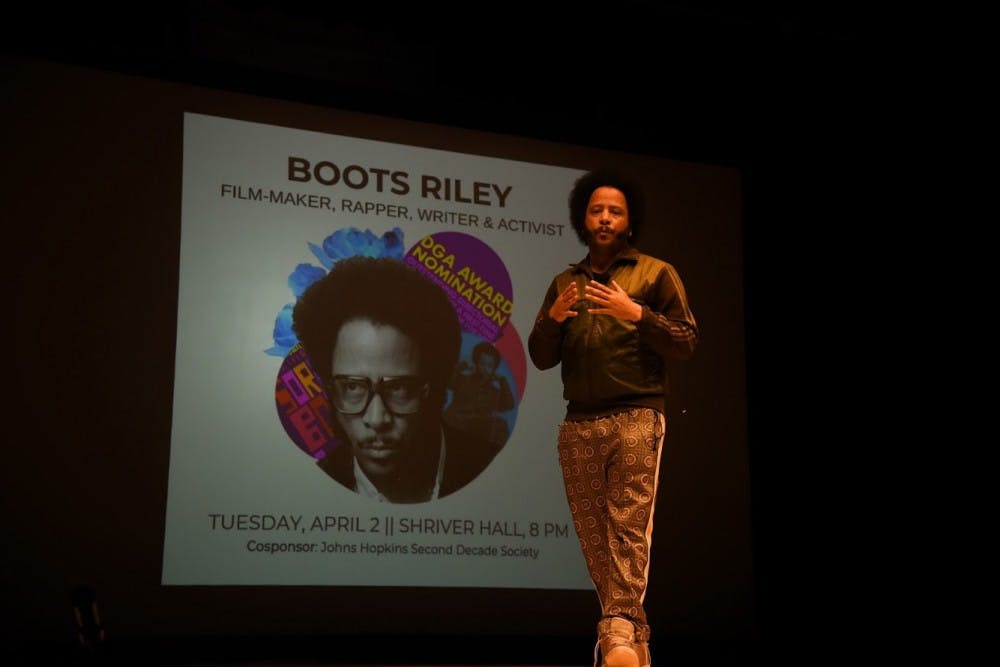Filmmaker and activist Boots Riley spoke at the Foreign Affairs Symposium (FAS) in Shriver Hall on Tuesday. Riley, who directed the 2018 film Sorry to Bother You, discussed the intersectionality between poverty, capitalism and racism — stressing the importance of social justice.
Boots began his talk by examining the connection between capitalism and poverty.
“Poverty is not some unintended consequence of capitalism. It’s not just something that exists, and we’ve got to figure out a way out. Poverty is a necessity of capitalism,” Riley said.
Riley elaborated on this theory. According to him, when employers are in need of workers, wages will go up because workers can demand fair pay, but when unemployment is high, employers have more control over wages because people are willing to work for less money.
Because of this, Riley concluded that unemployment will always exist. Therefore, he added, people who are unemployed will often resort to illegal methods of making money.
Both illegal and legal business, Riley believes, use violence to keep order. If someone steals from a grocery store, for example, the police would be called. Illegal businesses too, he argued, are regulated through a system rooted in the fear of violent retaliation. Riley explained that both of these systems are the same, but only one is considered illegal.
Therefore, Riley explained, capitalism is one of the root causes of poverty and crime.
“We are sold this whole thing, that poverty, crime come from people being raised wrong, and that poverty and crime come from people not learning how to dress right, and not learning how to speak to each other nicely,” he said. “But what we call crime and poverty is what we get with capitalism. It’s what has to exist if you want capitalism. If you don’t want poverty, and that particular violence that is sometimes associated with it, you have to get rid of capitalism.”
Riley then explained that in most capitalist systems, people blame the impoverished for their misfortunes.
“How do you theoretically explain to most of the people that their poverty is just something they got to live with and deal with? You don’t. You say poverty is the fault of those impoverished. That they made a bunch of bad mistakes. That there is something wrong with their family structure. That there’s something wrong with the culture, the music that they listen to,” he said.
Riley also believes that capitalism systemically promotes racism.
“If you can say ‘look at these dark people, they’re fucked up, that’s why they’re broke, that’s why they’re poor,’ [and] you list off the reasons why, then you explain how all they need to do is have more information. Be nicer, be kinder to each other and everything will be fine,” he said.
Riley further commented on the role of protests in creating change. He explained that before the 1960s, people would take physical action such as occupying factories for higher wages, thus effectively disrupting the system. However, by the 1960s, people began just protesting in the streets, without truly disrupting systems of power. According to Riley, this peddles a false idea about how power works.
He explained that it was wrong to think that enough people raising their voices would cause change. The only way to create change, he believes, is a widespread, radical and militant labor movement that promotes social justice, gaining power by withholding labor.
Sophomore Elizabeth Raphael enjoyed the talk and believes it offered insight into how each of us fits within the current capitalist system. However, in an email to The News-Letter, she explained that it would have been helpful if Riley discussed more tangible experiences.
“Overall, I would have liked to hear more about his personal experience as an activist or as an artist instead of like talking generally about the flaws in capitalism,” she wrote.
Freshman William Leister had a more critical view of some of the themes Riley discussed but nevertheless appreciated his perspective.
“Some of the things he talked about... I don’t think really [make] sense in our world today,” he said. “[Capitalism] has been one of the concepts that’s increased global wealth probably the most in the world over the last however many years. But besides that, I think that he was a really interesting guy to listen to and to listen to that side of the argument, and certainly for someone that prestigious to come to Hopkins... is pretty cool,” he said.





